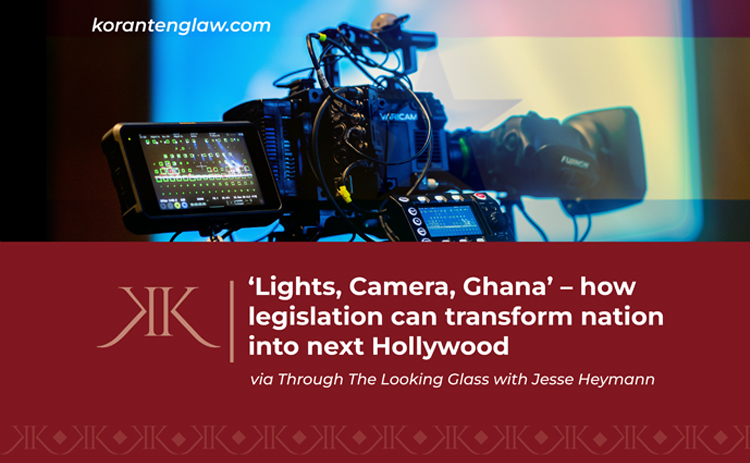
What would you say if I told you that I had a pitch for a US$40 billion industry right here in Ghana?
What if I also told you that this industry is not oil and gas or agriculture, nor technology or finance? None of that.
Well, you would say I am crazy. Who wouldn’t? Those are the industries we know which make that kind of money. Where else could that amount of revenue be hiding?
Believe it or not, that is the amount of revenue Hollywood is worth. The Hollywood film industry received earnings of up to US$5.99billion in 2022. The U.S. film industry has a total of 2.5 million employees. If Hollywood was a country, it would have the 12th highest GDP in the world – ahead of countries like Australia and Spain.
This is not an isolated phenomenon. There is The Indian movie industry, commonly referred to as Bollywood (Hindu speaking side of the country) and its companion Tollywood (from the Telugu-speaking region of the country) together worth US$2 billion, and the fastest-rising movie industry in the world, expected to reach US$2.5 billion by 2025. There is also the Chinese movie industry, which generated revenue of US$17.7 billion in 2022, up from US$10 billion in 2021, and the South Korean film and television industry, which generated US$1.3 billion and US$6.5 billion in 2021, respectively.
The fact of the world is that people will pay a great price to get entertainment in whatever form they can get it, and will craft their entire personalities and identities around the pop culture that they consume, in the form of clothing, accessories, gaming, social media consumption habits, etc.; and this will always be a huge money maker, particularly now in a rising global middle-class economy.
But you probably already knew that. Here is one story you probably did not know; the story of how a state went from a middling player on the American entertainment industry scene to the leading state for film and television production + the state of California. The total value of production spending in Georgia has increased by over 400percent from 2007 through 2010, with total annual production spending in Georgia exceeding US$600 million in 2010. An absolute juggernaut.
Georgia is now termed the “second Hollywood” by many industry experts. And they did it with just 17 pieces of paper called the Georgia Entertainment Industry Investment Act. GA Code Title 48 – 7 – 40.26 (2019)
But before that, we need to talk about Ghana’s TV and movie and TV industry.
Trouble Brewed in a Ghanaian Pot
Film-making is a tough business even in advanced economies. It requires a lot of capital yet comes with significant uncertainty in terms of profitability even among the best producers. In a developing industry like that of Ghana, those challenges are exacerbated tenfold, fraught with challenges of inadequate capital, copyright infringement, piracy, and the ability to make profits is even dimmer.
Data and statistics on the financial state of the Ghanaian movie industry are hard to come by, which in itself is rather telling of the state of the matter. But accounts of industry veterans and aficionados give us a glimpse into the status quo.
Some actors in Ghana bemoan the unprofessional attitude in most productions, with many of its financiers treating it as a hobby rather than a business. The lack of enforcement of copyright and intellectual property laws to protect content from digital theft further compounds the problem, as well as a lack of realistic and pragmatic industry structures.
This is a familiar tale told by many insiders and outsiders observing the industry.
On the production side of things, funding and distribution channels still pose a huge challenge, as echoed by director Peter Sedufia in an interview with Y FM;
“Now, if you take a lot of Ghanaian films, we’re not at the stage we want to be where we can say that we’re a world-known film-producing country. It takes time so we cannot throw out the fact that not all things are of the standard. We can also not throw out the fact that some films made in Ghana are of the international standard because people are making good films. The only reason why a lot of people are not making the kind of films they want to make is that they do not have the funds for it… when you get the funding and you make the film, you need to be able to sell it to make the money back and even with some profit to continue making films”.
Popular Ghanaian movie actor and leader of the Kumawood Actors & Actress Association, Bill Asamoah in an interview with Delay, also opined on this, indicating that the streaming marketplace has changed consumer habits to smartphones and digital platforms and decimated the CD and home video market. The local industry did not adapt nearly fast enough and is still reeling from the shock.
The casual Ghanaian observer would scarcely disagree.
The case study of Georgia
Just as the state of Georgia transformed its industry to be on par with Hollywood, Ghana can spark a renaissance in the cinematic arts with one simple legislative move. Not only can we do it too, but we also stand uniquely positioned to benefit from this with relatively low risk and low capital investment required from the state.
The Georgia’s Entertainment Industry Investment Act, enacted in 2008 by the Georgia legislature unleashed a wave of investment, making the state a hotbed for film and television productions. This forward-thinking legislation provides an array of attractive incentives for production companies, making it a premier destination for filmmakers.
The key factor lies in the generous tax credits offered by the act. Production companies can enjoy substantial tax incentives, rebates, and exemptions, creating a favorable business environment and significantly reducing the financial burden of shooting in the state.
Key Features of the Georgia Entertainment Industry Investment Act
Application For The 30percent Tax Credit: The applicant (the production company), submits an application package to the Georgia Department for Economic Development (GDEcD) for certification of the Project when the project starts preproduction in Georgia. The application package is submitted electronically when complete to taxcredit@georgia.org. The base application qualifies a production for a 20percent tax credit, with additional requirements for an added 10percent.
Eligibility and Submission: For features, television movies, pilots, series, TV specials, and music videos, the application package consists of proof of funding and script.
For commercials, the application package consists of the 20percent tax credit application, proof of funding, and the script/creative and, if applicable, storyboards.
For feature and television projects, applications must not be submitted earlier than 90 days before the start of Georgia principal photography (the phase of film production in which the bulk of filming takes place) but must be submitted before principal photography concludes. Commercial and music video project applications must not be submitted earlier than 30 days before the start of principal photography but must be submitted before principal photography wraps. Typically, the application package is submitted when opening the Georgia production office, which signals the start of preproduction.
For the additional 10percent Georgia Entertainment Promotion (GEP) Uplift tax credit, feature films and television projects must submit the script along with a completed GEP Uplift application to the Georgia Department for Economic Development (GDEcD). Music videos must submit the song lyrics and storyboards, along with a completed GEP Uplift application. TV commercials do not qualify for the GEP Uplift. This means including the logo of the GEP Uplift program in your content (usually in the credits).
If a production company cannot or does not want to include the logo in their Project, they can apply for the 20percent tax credit only, or instead of the inclusion of the GEP Uplift logo, the production company may offer alternative marketing promotion opportunities acceptable to GDEcD. The decision whether to include the GEP Logo or pursue the Alternative Marketing Opportunity must be made at the time the Project applies to pursue the GEP Tax Credit, and the decision is final.
The 10percent GEP Uplift will not be awarded until proof of multimarket distribution is provided within 5 years of awarding the base (20percent) Tax Credit Certification Letter. Before submitting the Distribution form, verification is provided to confirm that the GEP logo has been included in the Project as legislated or Alternative Marketing Opportunities have been met. Additionally, all supporting materials (crew, vendor, and location lists, signed call sheet from the first day of principal photography, final shooting schedule, promotional photographs, and a completed form detailing expenditures has been provided to the Georgia Film Office.
What documents can be provided for proof of funding?
Proof of Funding: The GDEcD will require proof of funding that the Project has assets that equal or exceed 75percent of the total budgeted cost of the Project at the time the applicant applies for certification. These assets can be owned by the applicant, provided by a third party under a financing or funding agreement, or a combination of the two. Such proof may include payroll statements, bank statements, and financing or funding agreements, including in-studio financing letters or agreements.
An application must be submitted for each specific Project for each year that credits will be claimed.
A “Project” is defined as live-action or animated and maybe a single televised commercial, a music video, a studio feature film, an indie feature film, a TV movie, a TV pilot or episode, TV Miniseries or an entire TV series season produced in Georgia.
The film credit may be assigned to a subsidiary. If the production company assigns the credit to an affiliated entity, the affiliated entity can only utilize the credit against its income tax liability; the affiliated entity cannot use the credit against withholding tax. The affiliated entity cannot sell the credit.
Expenditures made outside the State of Georgia do not qualify for the tax credit. Rentals and purchases that count towards the credit are made with companies that meet the Georgia vendor rule requirement. This rule defines what a local vendor is for purposes of claiming a tax credit under the policy.
Wages Paid to Individuals Working in Georgia: Wages paid by an out-of-state payroll company on behalf of the production company to an individual working in Georgia on a certified production qualify for tax credits, as long as they have for the time worked in Georgia.
“Loan Out” Employees: Directors, actors, or other production personnel employed on a production as a “loan out” can be eligible for tax credits. However, their salaries must be reported for withholding at the Georgia Tax Center.
Hotel and meal per diems incurred in Georgia are considered qualified expenditures for the tax credit. Union pension and welfare payments are also qualified expenditures if paid to the union as part of pension, health, and welfare. Health insurance premiums qualify if paid to the union. However, all qualified expenditures must be attributed to Georgia.
Payroll Processing Fees: Payroll processing fees can be considered qualified expenditures if the payroll company is a Georgia vendor and the services are rendered in Georgia.
To qualify as a Georgia vendor to claim a tax credit on expenses, a person or business must meet the following criteria:
- Sales or Rental of Goods/Services: The individual or business must sell or rent a type of property or provide a service that is not performed at the filming site, which is directly related to the production expenditure, as part of their regular business activities. They should have an inventory of the same type of goods in Georgia.
- Physical Location in Georgia: The vendor must have a physical location in Georgia where at least one individual works regularly. This includes home-based businesses that meet the requirements of a Georgia vendor. Merely registering with the Georgia Secretary of State or appointing a registered agent in Georgia does not establish a physical location.
- Registration with the Department of Revenue: The vendor should be registered with the Georgia Department of Revenue for the collection of sales and use tax.
- Local Business License: The vendor must possess a local Georgia business license. The production company is obligated to obtain a copy of the license from any Georgia vendor if the total amount of purchases exceeds US$10,000 for that vendor during the taxable year. The certificate for the Project is issued by the Department of Economic Development.
- On-Set Services: For vendors providing services on the set, they must be identified in the daily production reports.
It is important to note that vendors acting solely as conduits, facilitating purchases and rentals that would not otherwise qualify, are not considered Georgia vendors for those specific transactions. Tax credits are not claimed by the production company until the tax return is filed for the tax year in which the expenditures are incurred, and the US$500,000 minimum spend is met. If an audit is mandated on the Project the audit must be completed, and the tax credits certified to claim or transfer the credits.
As of 2023, all Projects will be required to undergo an independent audit.
Transferability of Tax Credits: Credits can be transferred to any Georgia taxpayer, whether an individual or a corporation. This flexibility allows credits to be utilized by entities that may not have been directly involved in the production process.
Carry Forward Period: Unused film tax credits, issued their final certification, can be carried forward for up to three years from the close of the taxable year. This provision allows production companies and transferees to utilize credits over an extended period.
The legacy of Georgia’s tax incentive programme on its creator economy
The Georgia Entertainment Industry Investment Act (tax credit) has created significant economic impact, adding over US$800 million annually to the State Gross Product and supporting over 11,000 full-time equivalent jobs. Local businesses and communities have reaped the rewards of this booming industry. From small-town eateries and cozy bed-and-breakfasts to the bustling production studios and post-production facilities, the surge in film and television projects has breathed new life into Georgia’s economy. Job creation has skyrocketed, offering employment opportunities to thousands of Georgians, from aspiring actors to skilled technicians, further strengthening the state’s workforce.
In 2017, Georgia-lensed feature film and television productions generated an economic impact of US$9.5 billion during FY 2017. The 320-feature film and television productions shot in Georgia represent US$2.7 billion in direct spending in the state.
Since the introduction of the film tax credit in 2005, Georgia has become a leading state for film and television production. The total value of production spending in Georgia has increased by over 400percent from 2007 through 2010, with total annual production spending in Georgia exceeding US$600 million in 2010.
The film tax credit has been credited with attracting major film and television productions to Georgia, including The Hunger Games, The Walking Dead, and Stranger Things. The tax credit has also helped to create jobs and stimulate the economy in Georgia.
In 2014, the Motion Picture Association of America (MPAA) estimated that the film and television industry in Georgia supported over 25,000 jobs and generated US$9.5 billion in economic activity. The MPAA also estimated that the film and television industry in Georgia paid US$1.2 billion in state and local taxes.
Moreover, the act has paved the way for homegrown talent to flourish. Georgia’s vibrant creative community has blossomed, with local filmmakers, actors, and musicians finding unprecedented opportunities to showcase their skills and captivate audiences worldwide.
Beyond economic and cultural impacts, the Georgia Entertainment Industry Investment Act has elevated Georgia’s global profile. Countless iconic films and popular television series have been filmed against the backdrop of Georgia’s stunning landscapes, showcasing the state’s diverse beauty to audiences around the world. This exposure has not only attracted tourists and visitors but has also positioned Georgia as a premier destination for both leisure and business travel.
Why Ghana is primed for a law like this
In recent years, Africa has emerged as the next frontier for investments in the entertainment industry. With its rich cultural heritage, diverse landscapes, and talented pool of actors and filmmakers, the African continent offers immense potential for growth and innovation in cinema. One notable success story is the impact of movies like ‘Black Panther’ and ‘The Woman King,’ which have showcased Africa’s storytelling prowess and captivated global audiences. To harness this momentum and further propel the Ghanaian movie industry, implementing a tax credit legislation similar to the Georgia Entertainment Industry Investment Act could be a game-changer.
Ghana is burgeoning with factors that not only will guarantee a bill like this, if passed, will work, but will also exceed any expected outcomes by an astronomical degree.
The English Advantage – The fact that the dominant producer of popular culture (the United States) is English-speaking gives us the leverage of offering the ability to travel, conduct business, and use the human resources of the country in production (actors and crew) without the hassle of the language barrier. It brings some stability, ease, and universality to doing business here.
Diverse Climate – Georgia did not become the prime filming location of the modern age for just the legislation alone. The state has a multi-variance of landscapes for making every flavour and genre of film set in any period and location; mountains in the northern part of the state, where the Appalachian range traverses the state with rolling hills and charming small towns. Atlanta, the state’s capital and largest city, offers a bustling metropolitan atmosphere with its modern skyline and iconic landmarks. The coastal plains in the southern part of Georgia feature marshes, while the Piedmont region offers rolling plains and farmlands. The Chattahoochee-Oconee National Forests span over 866,000 acres, offering a diverse range of forested areas, and places like Providence Canyon State Park offer a desert landscape.
Similarly, Ghana has a variety of exquisite and diverse ecosystems for filming – marshlands in the south, savanna in the north, cityscapes in the south, thick tropical forest in the west, beautiful beaches along the coastline, grassland and plains for miles, and rolling hills at high altitude in the middle of the country.
Cheap Labor – Ghana has the competitive advantage of offering human resources at a more competitive price than the competition on the market, which forms a substantial part of filming expenditure. This can radically drive down the cost of production for film studios. Profit is the most significant consideration perhaps above all else in a studio’s decision to greenlight the Project, and Ghana can outcompete other countries in labor by a wide margin.
Favourable Exchange Rate – Greater purchasing power is available to investors, as their dollar can offer far more leverage here than in most locations in the West, which makes it monetarily sensible to spend the budget here, where it can do more for less.
These factors have been present for a while, but as with Georgia before 2008, it requires a legislative incentive to tip the scales. Even small movies are million-dollar investments and large movies are multi-million-dollar transactions. Risk keeps the industry in a loop of following precedent. By offering the tax credit, studio executives can make a convincing pitch for why the country offers the best competitive advantage on a pure common-sense basis, which will trigger a change in practice over the course of years and decades, just as with the case of Georgia.
There exists in the status quo a number of tax incentive legislations, indicative of the fact that this is not an investment mechanism that is alien to our corner of the world. Residents in Ghana are eligible for a credit for foreign income tax paid on their foreign taxable income under the Income Tax Act, 2015 (Act 896). The credit cannot exceed the average rate of Ghanaian income tax for a year.
The Ghana Investments Promotion Centre Act, 2013 (Act 865) also provides incentives to encourage strategic investments in various sectors, including agriculture, manufacturing, construction, mining, and tourism. Incentives include exemptions from customs duties, reduced corporate income tax rates, favorable investment and capital allowances, and guarantees against expropriation. Venture capital tax incentives in Ghana also include relief from stamp duty on equity share subscriptions, a reduced tax rate of 1percent on interest and dividends from venture capital investments for the first ten years, and the ability to carry forward losses for five years. Companies registered as free zone developers/enterprises in Ghana also enjoy a corporate tax holiday for the first ten years of operation under the Free Zones Act, 1995 (Act 504). After the tax holiday, the corporate income tax rates are 15percent for export sales and 25percent for sales in the domestic market.
How a Bill like the GEIIA will fix our movie industry
Funding – Movies and television are by far the most cost-intensive medium to produce content with. This is because it involves a vast array of logistics like locations, sound equipment, video, editing, cinematography, visual effects, hair and make-up, costuming, scriptwriters, etc. This makes the bar to entry extremely high, and this can be alleviated with an influx of foreign direct investment in the form of studios looking to cut the cost of their productions down.
By creating a tax incentive for investors to come film in Ghana and establish studios here, this creates the opportunity for young Ghanaian filmmakers, writers, editors, cinematographers, hair and make-up artists, set designers (Including handymen like welders, electricians, carpenters etc.) to get a stream of income and potentially garner enough skills and notoriety by way of their work to be put in charge of their projects/ departments.
Technical Knowhow – A potential increase in the number of film studios and film projects being conducted in Ghana could necessitate the need for these investors to take on local labour in the filming and production of these various projects because financially, it is simply cheaper than flying in the entire secondary crew from California or New York. This would open opportunities for Ghanaians in the creative arts industry to be taught new skills, which will transform into leverage they can use to start their businesses here or rise up in ranks in these film studios. It can also create a talent pool for other film studios in the future looking to find cheap labour.
Employment – It will serve as a source of employment for millions of Ghanaians not only in direct jobs from production but also in ancillary jobs like cleaners, security and administrators, advertisers, etc.
Publicity – It will raise the profile of the country on the international stage as a destination for tourism, in keeping with the government’s efforts to market Ghana as a travel destination with the ‘Year of Return’ trend, where Ghana witnessed a remarkable surge in tourism, attracting a significant influx of African American visitors and global attention. Designed to commemorate the 400th anniversary of the arrival of enslaved Africans in America, the Year of Return initiative called upon the African diaspora to reconnect with their roots and explore the vibrant culture and heritage of Ghana. The impact was profound, with statistics revealing a substantial increase in African American visitors to the country.
In fact, during the Year of Return, Ghana welcomed over 1 million visitors, many of whom were prominent celebrities and stars seeking to experience the warmth and hospitality of the Ghanaian people. This momentum has continued to thrive, cementing Ghana’s position as a popular December tourism destination, with the country hosting high-profile events such as the Global Citizen concert.
Notable personalities such as Dave Chappelle, Kendrick Lamar and Idris Elba have graced Ghana’s shores, contributing to the nation’s rising profile in the international entertainment scene. This is a snapshot of the extraordinary benefits in tourism we stand to reap from measures such as a film tax credit.
Infrastructure – A lot of facilities go into filming major motion pictures, which often demands the construction of large film sets with multiple filming facilities or ‘sound stages’ where movies can be mass produced for cheaper, for instance, by cutting down the cost of renting locations or having filming delayed by bad weather. This leads to these entertainment companies having to dig down roots in that particular country or city, which becomes a permanent fixture for use in the far future.
For example, Florida is inextricably linked to the operation of the Disney company because Disneyland is in Orlando, which is a renewable source of employment for the people there, as well as benefitting from corporate social responsibility projects like the Disney Dreamers Academy, a scholarship program.
Another example is one from Africa. During the filming of Star Wars, the desert in Tunisia was used as the set of the alien planet Tatooine. The alien habitation set was left there after filming, and to date, serves as a tourist attraction for Star Wars fans.
Quality Ghanaian Content – This policy would also, in the long term improve Ghanaian content as a whole. Studios do not only get money from producing their intellectual property, but they also monetize their infrastructure like cameras and sets by doing rental services for anyone who wants to take advantage of their services. This would translate into more quality productions from the Ghanaian industry. This measure would also draw industry talent to Ghana, which would lead to more quality human resource availability.
Boost the Local Economy – This policy would also boost the local economy. Investors cannot just travel to the country in a vacuum. They will need places to sleep, eat, and do laundry. They will need transport, guides and shopping for various needs. The nature of film is inherently a team project. The minimum number of crew for a low-budget movie is 10 to 20 people. For a high-budget movie, which is around 100 – 200 people. That is a lot of ancillary business being brought to the economy, even for just one project. This also comes with the benefit of helping to tamp down currency depreciation effects, as the supply of the dollar in the country is higher than it ordinarily would have been, all year round.
High Return for a Low Cash Investment – Just like the ‘Year of Return’ marketing model, which was a relatively low-cash investment, high-reward venture, a policy like this provides extraordinary leverage for a little amount of effort invested, and there is no ‘money lost’ because there is little to no GDP coming in from the Ghanaian movie industry in the first place. This is a proposition with no downside, and maximum upside, making it a very lucrative win for any government to execute.
Furthermore, the government could adopt a policy of re-evaluating the tax exemption every 5 to 10 years to expand revenue if the occasion demands it. This strategic approach takes into account the commitment and utilization of infrastructure, significantly reducing the likelihood of losing investor retention. Moreover, implementing such a policy would enable the government to generate revenue by taxing these corporations, ensuring that the country’s resources and facilities are enjoyed and utilized effectively.
This is beneficial to the film industry in Ghana because it serves as a source of funding to fund more film projects of more complexity and scale. Of all the mediums of art, film, and television poses perhaps the greatest barrier to entry, requiring high technical expertise and finance. Many talented professionals are deterred from aiming for a career and this causes a burden on white-collar sectors of the economy in the form of over-production of labour to saturated industries or causes brain drain as these gifted individuals seek a life overseas.
Potential Concerns/Criticisms
Loss of Tax Revenue – This concern is easily addressed. Besides the government having to draft the bill and pass it, there is little by way of financial commitment having to come from the government of Ghana.
It is bringing a new industry on board that has historically put very little back into the state pocket by way of taxes.
This sets the stage for industries to come and dig down roots in Ghana in the form of movie studios, sound stages, sets, and rental facilities for equipment and hotels, etc.
A primary example of this is Tesla and China, where China, being without the intellectual property and technological know-how of the best electric vehicle maker in the world, invited Tesla to come and set up in their economy, and since then has raised the regulation and taxation steadily, growing their economy from the revenue accumulated from such an endeavor. China is now poised to lead the world in electric vehicle manufacturing, because they set the stage first with enticing profit incentives.
It would be in error to try plucking the seeds before they have borne fruit (to try and optimize for tax volume when the model has not been tested and proven yet).
Drive Up Cost of Living – The influx of foreign investment often triggers artificial inflation of prices, as retailers see the higher purchasing power from persons from a country of relative wealth, and thus take advantage of that to charge higher prices. This has become a challenge in some communities already like mining towns in the middle of the country with a lot of Chinese citizens residing there. This is a real concern, and the local people should not have to be priced out of the affordable standard of living that they had. Furthermore, any rise in prices is likely to be offset in utility by the hundreds to thousands of new jobs that a potential policy like this could provide, thus it is still worthwhile in the long run.
Gentrification – A massive influx of foreigners would impact the prices of commodities, so it would be with property prices, leading to the phenomenon known as gentrification. This is when property prices sharply increase during a period, forcing renters and home buyers in lower to middle-income neighborhoods out because they can no longer afford the property prices in the neighborhoods, they grew up in.
Again, this is a very real concern that has played out in real-time in places like Costa Rica, where a vast percentage of white Americans migrated to take advantage of lower taxes, leading to protests by local citizens, and has even become a problem in Atlanta, Georgia, where the Georgia Entertainment Industry Investment Act was passed a little over a decade ago.
This can be curtailed in several ways. One, zoning laws can be enforced to make sure that infrastructure like movie studios are not constructed in areas with low-income housing.
Also, regulations can be passed to ensure that landlords in certain areas where film studio infrastructure will be set up either temporarily or permanently, do not take undue advantage of the situation to hike up prices to a ridiculous degree.
Cultural depictions – There is also the looming problem of insensitive/offensive cultural depictions, which might occur with such a policy. This is a problem for the primary reason that as the government represents the peoples will it flies in the face of that mandate to allow Western influences to come in and use the resources of the country to depict cultural elements which might run contrary to the collective ethic of the people of Ghana. This is not alien to the Western political structure either. The United States Military has the Film Liaison Office, part of the Department of Defense’s Public Affairs division, that reviews Hollywood scripts before approving movies that make use of military facilities and personnel in the footage. They check for negative/harmful depictions of the US military. Many films are screened through this system such as billion-dollar hits Top Gun: Maverick and Captain Marvel. There is precedent for such checks and balances even in the West, and this is something that the country can easily incorporate with a potential policy like this, such as;
- Reviewing of scripts – Scripts can be approved by a board before filming to ensure that it does not contain harmful or insensitive cultural depictions of the people of Ghana or her institutions.
- Cultural sensitivity training – This can be given to movie studios when they come to make them aware of the cultural/ethical landscape of the country and set the expectations for them as to the standards they would have to meet.
- Complaints Mechanism – This can be set up for citizens who have complaints or concerns about certain depictions to notify the authorities as a form of quality control and a democratic process of hearing out the people’s voice on the matter.
- Code of Conduct – A code of conduct can be crafted for filmmakers who enter the country to disincentivize vices like prostitution, and drug abuse as well as other kinds of behaviors that cut against the collective ethic of the people of the Republic of Ghana.
Asymmetrically Beneficial Relationship – There is the risk of this potential policy overwhelmingly benefiting the studios who come here to work, as they get a tax break and the country gets a mediocre return and lost tax revenue. Tax credits are often criticized for this very effect. However, this can be easily mitigated, with the following;
- Require that companies spend a minimum amount of money in the country to qualify for the tax credit – If the bill mandates that a minimum amount of money has to be expended before studios qualify for the tax credit, that will eliminate any sort of exploitation that might occur by getting the tax credit and not putting back a benefit in the Ghanaian economy of proportionate terms.
- Require that studios employ a certain percentage of local talent – As stated earlier, the cheap labour of the African market relative to the rest of the world makes it make financial sense to hire mostly local talent in the first place for the production crew. However, the government can grease the wheel even more by mandating that a certain percentage of the production crew has to be locally sourced. This will accelerate training for young creators and producers and increase employment in the entertainment industry on a magnitude that has never been seen before in the country’s history.
The unmatchable power of cultural impact
When you think of places in the West you would love to visit the instant you had disposable income and some leisure time, I bet New York, Paris, London, Venice, Rome or Amsterdam would be your top 10 if not top 5. This is no accident. There is a theory proposed by sociologist Robin Dunbar (The Dunbar Number theory) that the average human can only contain about 150 social relationships in their brain, suggesting that there is a cognitive limit to the number of references we can sustain in our regular mental orbit.
Elevating a country to city to pop culture relevance or notoriety helps serve as a sort of constant beeping mental signal in the popular imagination, such that it seems almost intuitive and happenstance that one should want to visit the Eiffel Tower or Disney World, as natural as liking candy. The insidious undergirding reason is that these have been in the background of the media your eyes have stored in your brain for decades. You associate them with your childhood, precious memories, or the exhilarating feeling while consuming content. It is no surprise that these remain tourist hotspots to this day.
Also, cultural elements are eternal. Movies, television etc. are being consumed today that were made 50 years ago, or remakes of movies that were made 50 years ago. New York or Paris does not have to run advertisements because the plot of a movie showing Times Square or the Louvre will promote the city to two billion eyeballs, basically for free. Simply put, there is no amount of advertising the government of Ghana could pay for that would have as much return as a policy like this on any scale.
This is a proven precedent, with many examples such as;
The Lord of the Rings (2001-2003) and New Zealand. The Lord of the Rings trilogy was filmed in New Zealand, and the country has seen a significant increase in tourism since the movies were released. In 2001, the year the first movie was released, New Zealand received 1.7 million tourists. By 2014, that number had increased to 3.8 million.
Game of Thrones (2011-2019) and Northern Ireland. Game of Thrones was filmed in several countries, including Northern Ireland. The show’s popularity has led to an increase in tourism to Northern Ireland, with many fans visiting the filming locations. In 2017, Northern Ireland received 2.9 million tourists, up from 2.2 million in 2012.
The Bourne Identity (2002) and Paris, France. The Bourne Identity was filmed in several cities, including Paris. The movie’s popularity has led to an increase in tourism to Paris, with many fans visiting the filming locations. In 2017, Paris received 19.1 million tourists, up from 17.4 million in 2002.
The Hangover (2009) and Las Vegas, Nevada. The Hangover was filmed in Las Vegas, and the movie’s popularity has led to an increase in tourism to the city. In 2009, Las Vegas received 40.7 million tourists, up from 38.5 million in 2008.
Twilight (2008-2012) and Forks, Washington. The Twilight Saga was filmed in several locations, including Forks, Washington. The movie’s popularity has led to an increase in tourism to Forks, with many fans visiting the filming locations. In 2012, Forks received 1.5 million tourists, up from 1.2 million in 2008.
Conclusion
The proposed tax incentive program represents a pivotal opportunity to transform Ghana’s movie and television sector into a dynamic force that propels our nation forward. It would attract foreign investments in the movie and television industry, leading to an influx of funding and creating opportunities for local filmmakers, actors, and crew members. This would boost job opportunities, both directly in production and in ancillary industries such as hospitality and transportation.
A bill like this would also elevate Ghana’s profile on the international stage, positioning the country as a desirable destination for tourism and business travel. Additionally, the establishment of film studios and production facilities would contribute to infrastructure development and stimulate the local economy.
With low cash investment from the government, this offers high returns and the potential for long-term growth of the Ghanaian film industry. While concerns about rising costs and gentrification may arise, they can be addressed through regulations and zoning laws.
Overall, this presents an opportunity for Ghana to showcase its diverse landscapes, talent, and culture to a global audience while reaping the economic and cultural benefits similar programs have brought to other countries. By providing the necessary support and adopting a forward-thinking approach, we can foster an environment where creativity thrives, jobs are created, and Ghana’s cultural legacy is celebrated on the global stage.
An appeal is made to policymakers, stakeholders and the entire industry to recognize the potential economic and cultural contribution the entertainment sector could bring and diligently act to create an enabling environment that triggers a resurgence in the industry’s growth, all with one single step; legislation.








